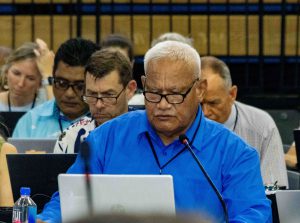 The 21st Annual Meeting of the Western and Central Pacific Fisheries Commission (WCPFC) has officially commenced in Suva, Fiji. Bringing together ministers, delegates, and stakeholders from across the Pacific and beyond, this vital meeting will address pressing issues related to the sustainable management of tuna fisheries, a key economic and ecological resource for the region.
The 21st Annual Meeting of the Western and Central Pacific Fisheries Commission (WCPFC) has officially commenced in Suva, Fiji. Bringing together ministers, delegates, and stakeholders from across the Pacific and beyond, this vital meeting will address pressing issues related to the sustainable management of tuna fisheries, a key economic and ecological resource for the region.
Tuvalu’s Opening Statement: Priorities for WCPFC 21
Hon. Sa’aga Talu Teafa, Tuvalu’s Minister of Natural Resources Development, delivered a compelling address, emphasizing the country’s commitment to sustainable fisheries and the priorities for the days ahead. Minister Teafa highlighted Tuvalu’s unique reliance on fisheries for economic stability and underlined three critical issues:
1. Target Reference Points (TRPs) for Yellowfin and Bigeye Tuna
Hon. Minister Sa’aga Talu Teafa stressed the importance of adopting TRPs for these key species as a step toward improved management. He acknowledged the complexity of balancing the needs of multi-species fisheries like purse seine and longline, advocating for a mixed fishery framework. Tuvalu supports focusing on the Bigeye Tuna TRP initially, with the understanding that current restrictions, such as FAD closures, may need adjustment.
2. Management of Fish Aggregation Devices (FADs)
FADs are critical for Tuvalu’s purse seine fishery, which accounts for over half of the country’s annual revenue. Minister Teafa defended FADs as an efficient and sustainable fishing tool, particularly when equipped with tracking technology and biodegradable materials. Tuvalu’s membership in the Parties to the Nauru Agreement (PNA) ensures that FADs are monitored, tracked, and responsibly managed.
3. Opposition to Increased High Seas Purse Seine Effort
Tuvalu voiced concerns over proposals seeking to expand high seas fishing opportunities, warning of potential threats to sustainable management and the economic benefits for small island nations. The minister firmly opposed these proposals, advocating for the preservation of current high seas restrictions.
Key Goals for the Meeting
The WCPFC 21 agenda includes measures to refine sustainable practices, ensure economic equity for small island nations, and address the growing global demand for tuna. Small working groups will tackle these issues, with the hope of reaching consensus on innovative solutions.
Minister Teafa concluded his speech with a message of unity and collaboration, emphasizing the importance of collective action in preserving the region’s vital fisheries.
Delegates expressed gratitude to the Fijian government for hosting this year’s meeting. Fiji’s role as a hub for regional cooperation underscores its commitment to fostering sustainable development across the Pacific.
As the week progresses, the outcomes of WCPFC 21 will shape the future of tuna fisheries management, ensuring both ecological balance and economic resilience for generations to come.